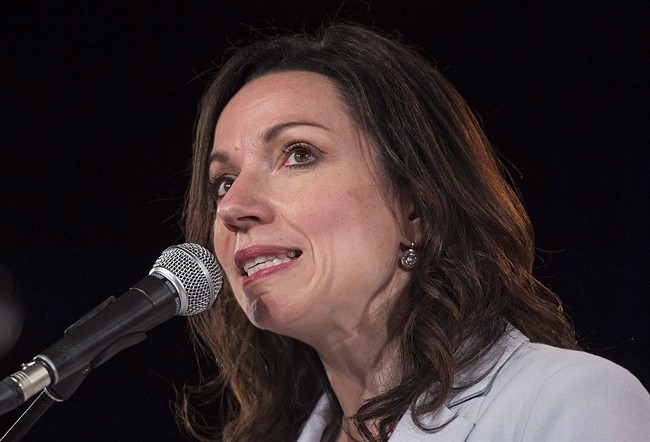Bloc Québécois Quebecois members resoundingly rejected the leadership of Martine Ouellet in a confidence vote over the weekend, even as they chose to support her vision of a party that focuses on Quebec’s independence above all else.

The party announced on Sunday that 32 per cent of members voted in favour of her leadership, whereas 67 per cent voted against.
Ouellet has yet to publicly comment on the result, but has previously said she believed getting the support of 50 per cent plus one would give her the legitimacy to stay on as head of the party.
She is expected to make an official statement on Monday.
The Bloc has been in disarray since late February when seven of its 10 members of Parliament quit over Ouellet’s leadership style.
Of the three who remained, only two still backed her heading into the vote.
READ MORE: Bloc Québécois youth wing drops support for Martine Ouellet
Ouellet, 49, has been described by some as controlling and uncompromising and many of her detractors accused her of focusing too sharply on Quebec independence instead of defending the province’s interests on the federal scene.
In mid-May, the Bloc’s youth wing withdrew its support of Ouellet, who is also sitting as an Independent member in the Quebec legislature after stepping away from the Parti Quebecois caucus.
The Bloc’s estimated 14,500 members were invited to vote by telephone or on the internet in a two-day vote that ran Friday and Saturday.
While members rejected Ouellet’s leadership, they appeared to support her vision of a party that is centred around independence above all else.
Some 65 per cent of voters approved the idea that the Bloc should support Quebec independence in their daily actions and promote it at every opportunity.
READ MORE: Ex-Quebec premier Bernard Landry gives support to Bloc leader
The voter participation rate was about 59 per cent, the party said.
Ouellet is a former Quebec cabinet minister who previously ran twice unsuccessfully for the leadership of the Parti Quebecois.
She has led the Bloc Quebecois since March 2017.
Ouellet, 49, has been described by some as controlling and uncompromising and many of her detractors accused her of focusing too sharply on Quebec independence instead of defending the province’s interests on the federal scene.
In mid-May, the Bloc’s youth wing withdrew its support of Ouellet, who is also sitting as an Independent member in the Quebec legislature after stepping away from the Parti Québécois caucus.
READ MORE: Former Bloc MPs to form new party called Quebec Debout
One of her advisors, Gilbert Paquette, refused to say whether Ouellet is planning to resign.
But former leader Gilles Duceppe, who has been a vocal opponent of Ouellet, said he believes she will have no choice.
“At 50 per cent plus one, it’s already ridiculous, at 32 (per cent), to me it seems clear,” he told The Canadian Press.
The two MPs who supported Ouellet said they were disappointed with the lack of support for their leader, but pleased with the party’s support for a pro-sovereignty mandate.
“It’s article one, it’s the fourth time we’ve spoken on it,” Marilene Gill said.
“And it’s clear, what people want is an active and assumed promotion of independence.”
READ MORE: Bloc Quebecois leader Martine Ouellet won’t quit after caucus turmoil
Duceppe, for his part, said he was optimistic about the vote result, which he said could open the door for the party’s renewal.
He compared the Bloc’s situation to that of the Progressive Conservatives following the 1993 election, when they were left with only two seats.
He suggested the party organize a leadership convention to be held at the end of the October provincial election.



Comments